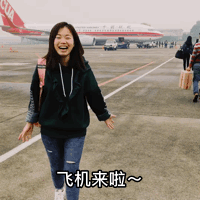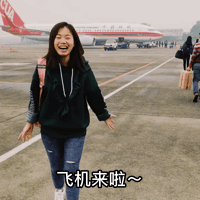
DAY1
Foshan Airport is really small and pitiful. You have to walk to catch a plane. This is my first time taking a United Airlines flight. You can only carry one piece of luggage. Remember to check the suitcase in.

Basic route:
DAY1: Tsinghua University (Tsinghua University is open on weekends, you can make reservations in advance using the WeChat applet) - Houhai - Shichahai - Yandai Xiejie
DAY2: Yuanmingyuan-Summer Palace-Water Cube (lights off at 9:30 pm)-Bird's Nest
DAY3:Forbidden City-Jingshan Park-Temple of Heaven
DAY4:Great Wall-Niujie-Wangfujing
DAY5: Dashilar-Qianmen-National Museum-Galaxy Soho
DAY6-7:Tianjin

Accommodation: Book a B&B with Audemars Piguet in advance. The location of the 2nd Ring Road is just right and the transportation is very convenient~
Transportation: Book your flight tickets in advance with Fliggy. I bought a map of Beijing on Taobao for reference, as well as a Beijing Card (very convenient for taking buses and subways). The return flight is from Tianjin to Macau~Qantas’ service is really great Like~
Clothes: The temperature difference between morning and evening in Beijing in April is quite large, so it is more appropriate to wear light-colored thin jackets/long-sleeved clothes (because wearing dark-colored clothes will be very hot in the sun)

Hello Beijing~
I'm coming


Tiananmen / Tian’anmen
When I come to Beijing, I definitely think of Tiananmen~
There are probably the largest number of people here in Tiananmen Square.

The best angle of Tiananmen is across Tiananmen Street. There are only a few people taking pictures at the railings, so you only need a little patience to take a panoramic shot.
The Chairman Mao Memorial Hall is right opposite and you can line up to go in and pay your respects.


Most tourists and tour groups take photos at the main entrance of Tiananmen Square, and the effect is basically that people are following the crowd.

The Palace Museum/The Palace Museum
You can reach the Forbidden City through the tunnel from Tiananmen Square. The peak season is from April 1st to October 31st. The Forbidden City is closed on Mondays. The official website shows that 80,000 tickets are open every day.
Don’t think about selling so many tickets at the venue, be sure to book your tickets online in advance.






The Forbidden City in Beijing was the imperial palace of the Ming and Qing dynasties in China. Forbidden City , located at the center of Beijing's central axis, is the essence of ancient Chinese palace architecture.
The Forbidden City in Beijing is centered on the three main halls, covering an area of 720,000 square meters, with a construction area of about 150,000 square meters. There are more than 70 large and small palaces and more than 9,000 houses. It is one of the largest and best preserved ancient wooden structures in the world.







Tour groups are all crowded in the middle, and there are fewer people on both sides. There is no culture suitable for taking pictures quietly~


Jingshan Park/Jingshan Park
After coming out of the Forbidden City, across the road is Jingshan Park. April is the season when peonies are in full bloom. You can overlook the entire Forbidden City in a short walk to the top of the park~

Jingshan Park was built in 1928 and was the imperial garden of the Ming and Qing dynasties. Jingshan in the center of the park is made of mounds of earth and was once the commanding heights of the city.


Jingshan Park

The first place of Jinghua Range Rover

The smog is a bit heavy~

Overlooking the capital



Temple of Heaven Park/Temple of Heaven
There are several attractions in the Temple of Heaven Park. Admission will stop at 4:30 pm, so please pay attention to the play time.
The Temple of Heaven was built in the 18th year of Yongle in the Ming Dynasty (1420), and was rebuilt during the Qianlong and Guangxu reigns of the Qing Dynasty. It was a place where emperors of the Ming and Qing dynasties offered sacrifices to the emperor and prayed for a good harvest. The Temple of Heaven is the general name for the two altars of the Circle Qiu and the Qigu Altar. It has two layers of altar walls, forming an inner and outer altar. The altar walls are round in the south and north, symbolizing the round sky and the square place. The main building is the inner altar, with the Circular Mound Altar in the south and the Praying for Grain Altar in the north. The two altars are on the same north-south axis, separated by a wall in the middle. The main buildings in the Circular Mound Altar include the Circular Mound Altar, the Imperial Vault of Heaven, etc. The main buildings in the Qigu Altar include the Hall of Prayer for Good Harvests, the Hall of Emperor Qian, and the Gate of Prayer for Good Harvests.




©Me and the Temple of Heaven



Yuanmingyuan/Yuanmingyuan Profile
The Old Summer Palace, also known as the Three Old Summer Palaces, was a large royal garden in the Qing Dynasty. After the Eight-Power Allied Forces, it was attacked by bandits and eventually turned into ruins.




©If you fall behind, you will be beaten.

The Summer Palace/The Summer Palace
The Summer Palace, a royal garden during the Qing Dynasty in China, is adjacent to the Old Summer Palace. It is very convenient to go to the Summer Palace from the Old Summer Palace ~




Bitches in the Summer Palace

April's peach
A large piece of pink and tender






Juyongguan Great Wall/The Great Wall
As the saying goes, if you don’t visit the Great Wall, you are not a true man ~ I chose the Juyongguan Great Wall where there are relatively few tourists.

The military defense project in ancient China was a tall, strong and continuous long wall used to limit the movement of enemy cavalry. The Great Wall is not a simple and isolated city wall, but a defense system with the city wall as the main body and a large number of cities, barriers, pavilions and signs.



long

city




Houhai/Shichahai/Yandai Xiejie
Beijing's "sea" hahahaha~ After visiting the major attractions, you can walk around Beijing's characteristic alleys at night and feel the fireworks of old Beijing Hutongs~
There are a lot of things to eat everywhere



Yandai Xiejie
At the end of the Qing Dynasty, it mainly dealt in smoking sets, framed calligraphy and paintings and antique jade articles. Strong urban atmosphere and rich old Beijing characteristics
Beijing characteristic commercial street~


Old Beijing Chicken Soup Wontons
There are quite a lot of people queuing up. The taste is average and a bit salty.
Encountered a shop selling jellyfish ~ there were so many people
There are also foreign TV reporters recording~


Dashilar/Qianmen/National Museum
Wangfujing/Galaxy Soho
Dashilan (Dàshílànr) I have read these words as - Dazhalan many times, a famous commercial street outside Qianmen in Beijing ~ Of course, it is basically filled with tourists.




Tong Ren Tang, Deyun Society, Daguan Tower...



©Laozi in the Museum

galaxy soho

Front door

What to eat in Beijing? Beijing Roast Duck, of course, in addition to Peking Roast Duck, I also discovered many special snack streets during this free trip, such as Heijiaochang Street, Guijie Street, snack streets around Yonghegong Temple (under renovation), Niu Street (Authentic old Beijing snacks that are 100 times more delicious than Nanluo Ancient Alley/Wangfujing)
Niujie: Lao Bao Du Man, Lotus Leaf Steamed Cake, Hung Kee Snacks, Jubaoyuan, etc. are super crowded.
Many oldBeijing grandparents buy food here~

//Bianfang Roast Duck
There are many branches, so I found a cheap one and ordered Beijing Roast Duck, Beijing Pao Sanwei (similar to stir-fried pork offal) , Osmanthus Glutinous Rice and Lotus Root (a dessert with glutinous rice stuffed in the middle of the lotus root hole) , crystal meat




north

Beijing




Hmm~ The roast goose from Guangdong is more delicious.

Copper Charcoal Hot Pot/Sheep and Scorpion
In Beijing in April, the weather is between 8℃-25℃. The cool weather at night is very suitable for eating hot pot. The most popular ones on the streets are copper charcoal hot pot and sheep scorpion.

Pair it with beef and mutton slices and dip it into a large bowl of sesame sauce for the original flavor.

At first I thought the sheep scorpion was a type of scorpion
Lamb Spine Hot Pot (Lamb Spine Hot Pot) is a complete lamb spine bone with tenderloin and spinal cord
Because its shape resembles that of a scorpion, it is commonly known as the sheep-scorpion.
Sheep and scorpion are low in fat, low in cholesterol, high in protein and rich in calcium. It is easy to absorb, has the effects of nourishing yin and kidney, beautifying the face and aphrodisiac. It is often used to make hot pot with clear soup and is delicious.
Super delicious, the store is full of people



©Yanjing, another bottle

//Various snacks

Donkey meat grilled
Shaobing

Fried sausage
A bit like Chaoshan potato starch and dried tofu

Old and full

Guijie pig trotters

←
Daoxiangcun pastry
The pastries in Daoxiang Village are so sweet!
You can see his shop on the street
Hot fried cake
→
It’s so sweet skr ~ Glutinous rice flour on the outside, sweet red bean paste filling


A bowl of stew
It always smells like pig

Chicken nuggets with toothpicks

fried noodles

sugar fire



Beef buns
Sugar cake
Salty Tofu Pudding
An authentic breakfast that’s so delicious that it explodes on the spot

©Heijiaochang Street
Heijiaochang Street is super popular and almost sold out around 9 a.m.. The sugar cakes have monosaccharide and disaccharide options. It is recommended that monosaccharide be used as it will not be too sweet. It is hot enough just out of the oven.
It tastes great when eaten with pickle strips~charred on the outside and tender on the inside, with a bowl of salted tofu curd(which is still acceptable as a southerner). Residents in nearby communities also like to have breakfast here~
Recording these days in Beijing~
The two days in Tianjin were mainly to attend a friend’s wedding


I haven’t visited any scenic spots, but I will come again. I like Tianjin. Thank you for your admiration for Cantonese~The pride of Cantonese people

A thousand people have a thousand feelings. During these few days in Beijing, the biggest feeling I had when I first arrived was that Beijing is so old and the air is not good. I love and hate this place, it is both indifferent and warm~( There are few smiles on their faces, but they are super patient when asking them for directions)

I can't help but call Beijing "Old Beijing". The streets are super clean, but when I enter the subway, I feel that the lights are dim and give people a sense of depression, including the several shopping malls and buildings I go to; and the cars on the road basically do not give way to pedestrians~
Catkins are flying all over the sky in April~ The deeper you go in Beijing’s Hutongs, you will find that you can discover beauty and treasures in the small shops and late-night pubs in the Hutongs. “Old Beijing” is probably a city that you can’t stop visiting for a long time~
For me, Beijing is such an "old Beijing". I will wait until I am 60 years old to experience the style of old Beijing again~



